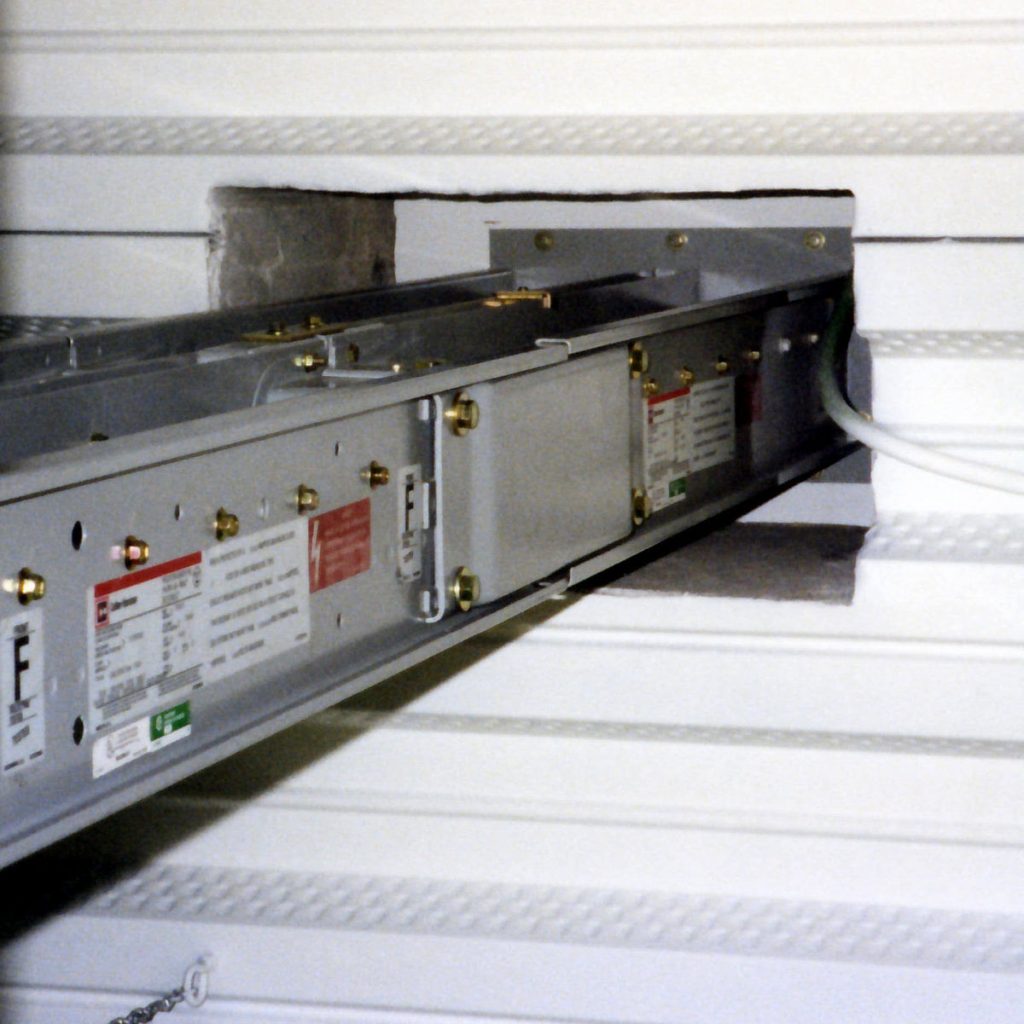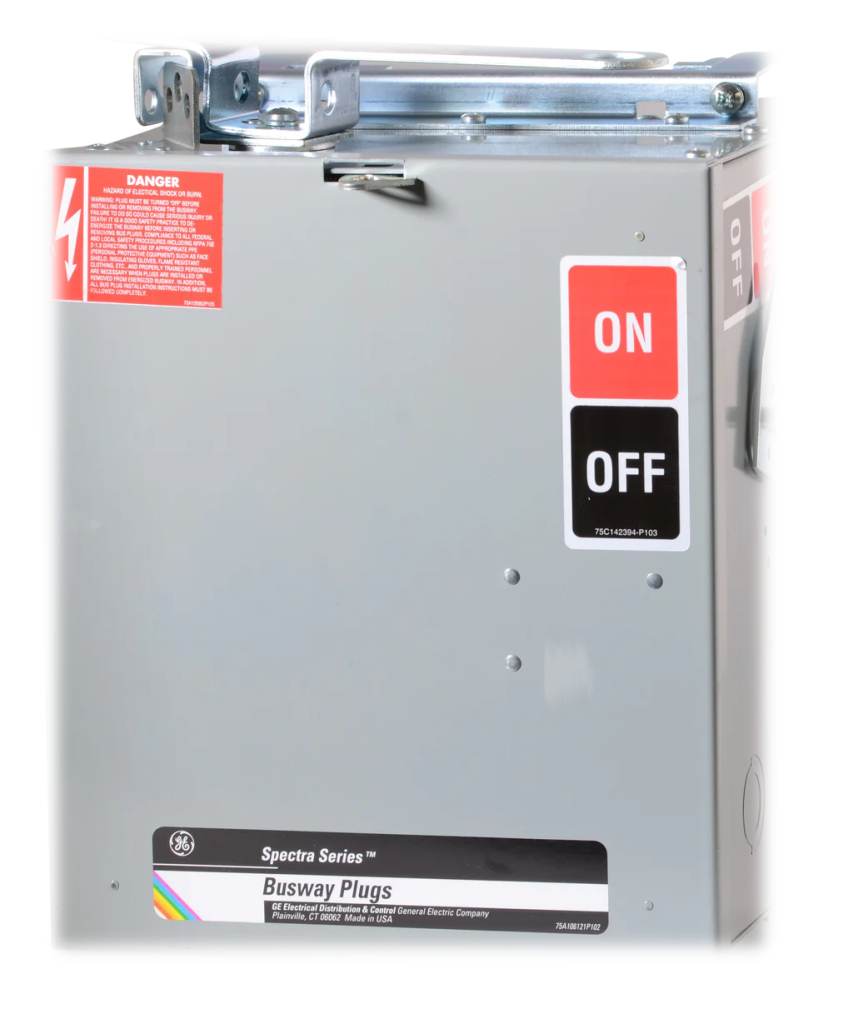Busway and Bus plugs for Power Distribution include heavy-duty electrical plugs to connect equipment for safe and efficient power distribution.
Need Bus Plug Products?
Get Bus Plug QuoteSell To Us
Got Electrical Equipment You Don't Need?

Reduce Your Electrical Inventories & Earn Cash
Sell My EquipmentPanelboard
Need a Panelboard for Your Project/Job?

Our Experienced Sales Engineers Can Help Design the Right Panelboard For You
Learn MoreTransformer Oil Testing
Is Your Transformer Due For Servicing?

Get Your Oil Analysis & Fluid Testing Done By Our NETA-Certified Techs
Learn MoreElectrical Product Resources
Product Training Product Safety Product Guides Product News Featured ProductsElectrical bus plugs, sometimes called bus duct, are heavy-duty electrical plugs used to connect equipment to a busway, which is a network of metal bars that conducts power throughout a building or facility. Picture a busway as the main structure’s electrical highway, letting power to move safely and reliably. This combination of electrical bus duct and busways allows electrical product safety while meeting the demanding needs of many different industries.
Simply put, Busway and Bus plugs for Power Distribution provide an electrical system where you can plug in heavy-duty machinery just like you would a toaster in your kitchen. That’s basically what electrical bus plugs do, but on a much larger and more powerful scale.
Breaker and Fusible Bus Plugs for Power Transmission
Bus plug installation with circuit breakers and fusible style bus plugs is important for the safety and performance of electrical power distribution. Bus duct plug circuit breakers are important for protecting your equipment with efficient, dependable, and scalable power transmission across a wide range of applications.
Busway and bus plugs for power distribution using circuit breaker bus plugs are called breaker style bus plugs. They operate by automatically blocking electrical flow when a fault, such as an overload or short circuit, is detected. They may be immediately reset when the fault has been resolved, making them ideal for areas that require frequent maintenance or where downtime is minimal, like data centers and commercial properties. Circuit breakers have an inbuilt mechanism that trips when the electrical current exceeds safe limits, providing immediate protection and easy repair.
Fusible-style electrical bus plugs, on the other hand, use fuses that melt when exposed to high fault currents, as a result cutting off electrical flow to protect the circuit. When a fuse blows, you must replace it. Fusible bus plugs are preferred in areas requiring higher fault current protection, like industrial manufacturing plants and renewable energy installations. They are rated according to the degree of protection needed against serious electrical faults, keeping your important devices protected from damage.
Busway and bus plugs for power distribution using circuit breakers give you an easy of reset and maintenance, and fusible bus plugs offer high fault current protection and straightforward fault indication.
7 Breaker Style and Fusible Electrical Bus Plug Examples
1. Industrial Manufacturing Facilities
Bus plug installation in your industrial manufacturing facility streamlines power distribution over large areas, making it easier to modify and expand the power system. This is important in situations where gear and production lines are constantly changing.
Busways give a flexible and scalable method for quickly adapting power distribution for both efficiency and safety. This decreases manufacturing downtime during equipment upgrades or reconfigurations for more uptime.
Breaker and fusible style bus plugs in the factory are good for these applications, providing reliable protection for delicate gear. They give rapid isolation of electrical issues, reducing risk of damage and downtime.
2. Data Centers
In data centers, bus plug installation in busways offers a dependable, adaptable, and scalable power distribution solution for your data center. They provide efficient power management, which is important in maintaining the uptime and dependability of your operations.
You need steady power to keep servers and other essential infrastructure running. Busways give you easy scaling of power distribution to meet increased demand while also allowing quick and safe maintenance activities.
Breaker-style bus plugs are excellent for data centers because of their precise protection and quick reset capabilities. Fusible bus plugs can also be used to provide higher fault current protection, keeping the power supply’s integrity and reliability.

3. Commercial Buildings
Busways and bus plugs are used in commercial buildings to control power efficiently and make future improvements easier. They allow variable power distribution, which supports changes in workplace layouts and equipment requirements.
You benefit from the modular structure of busways, making it possible for easy reconfiguration of power distribution with minimal downtime. This flexibility is required to accommodate tenant changes and office reconfigurations.
In commercial settings, breaker and fusible style bus plugs provide reliable protection while being simple to maintain. Breaker bus plugs give quick reset capabilities, while fusible bus plugs provide high fault current protection, maintaining the safety and dependability of your power system.
4. Healthcare Facilities
Electrical busway and bus plug installation at your hospital or clinic provide important power supplies thanks to their flexibility and dependability. Busways make sure that key medical equipment has continuous power, which is vital for patient care.
To support life-saving equipment and procedures, your healthcare facility must have extremely reliable power distribution systems in place. Busways offer a scalable option that is easily expanded or changed as your facility expands or changes.
Breaker-style bus plugs are frequently used in healthcare settings because of their quick reset capabilities, which are critical during power outages. Fusible bus plugs are employed where stronger fault protection is required to keep critical systems operating.
5. Retail Spaces
Busways in your retail environment provide adjustable power distribution that can support changing store layouts. They offer a versatile solution that accommodates a variety of power requirements as you reconfigure your facilities to improve the client experience.
You benefit from the modularity of busways, which allows for simple changes to power distribution without substantial downtime. This flexibility makes sense for upgrading your layouts and displays.
Breaker and fusible style electrical bus plugs are used to protect the power distribution system in retail settings. Breaker bus plugs allow for quick resets, whereas fusible bus plugs offer high fault current protection, ensuring the safety and dependability of your electrical system.

6. Educational Institutions
Busways and bus plug installation at your educational institution distributes power around campus buildings in a dependable and flexible way. Busways meet the different power requirements of classrooms, laboratories, and administrative offices.
Your school or university needs adaptable power distribution systems to serve a number of activities and equipment. Busways provide a scalable system that can be easily adjusted to meet changing needs, which improves the learning environment.
Breaker-style bus plugs are widely utilized in educational settings due to their ease of maintenance and quick reset capabilities. Fusible bus plugs are also used when more fault protection is necessary, assuring the safety and dependability of your power supply.
7. Renewable Energy Installations
Busways are used in renewable energy installations to distribute electricity in an efficient and scalable manner. They offer a versatile solution that meets the specific power distribution requirements of solar and wind power systems.
Your renewable energy installation takes advantage of busways’ scalability and flexibility, which lets you do simple extension and adaption to changing power demands. This flexibility is important for increasing the efficiency of your renewable energy installations.
Breaker and fusible style bus plugs are used to protect the power distribution infrastructure in renewable energy systems. Breaker bus plugs allow for quick resets, but fusible bus plugs provide strong protection against high fault currents, protecting the system’s stability.
Different Size Bus Plugs to Meet Power Requirements
Different size electrical bus plugs are needed to accommodate varying power requirements of different equipment and applications. The size of a bus plug is determined by its amperage rating, which indicates the maximum current it can safely handle.
For instance, smaller devices might only need a 30-amp bus plug, while larger machinery might require a 100-amp or even a 200-amp bus plug.
Choosing the right size ensures efficient and safe power distribution, preventing overloads and minimizing the risk of electrical failures.
30 Amp Bus Plug: For smaller equipment with lower power needs.
60 Amp Bus Plug: Used for medium-sized machinery and equipment.
100 Amp Bus Plug: Often used in industrial settings for larger machines.
200 Amp Bus Plug: Required for very large equipment and systems with high power demands.
Factory New or Refurbished Bus Plugs, Busway
Busway and bus plugs for power distribution are a solid investment. Whether you’re looking for factory-new or readily available, cost-effective refurbished busways and bus plugs, you can expect dependable and efficient power distribution across a variety of applications. These components offer the flexibility, scalability, and safety needed by contemporary power systems, making them a valuable investment for any facility.
